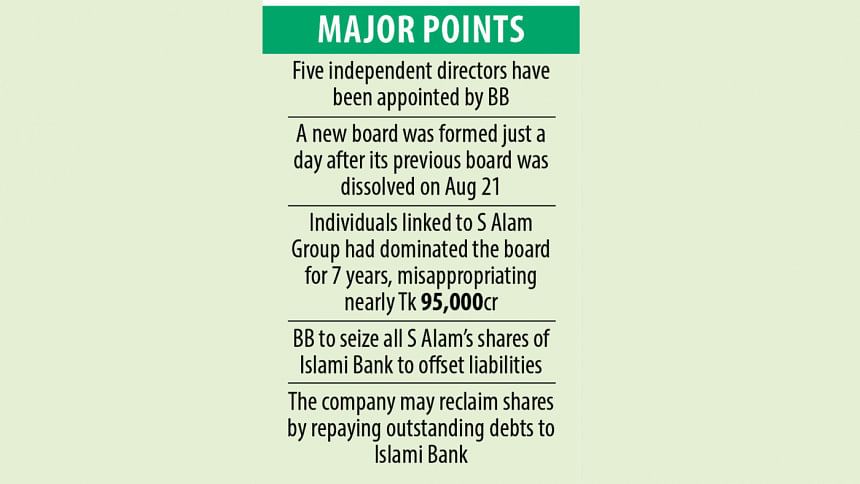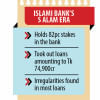BB forms new board for Islami Bank

The Bangladesh Bank has formed a new board of directors for crisis-hit Islami Bank Bangladesh, appointing five independent directors at the Shariah-based lender.
Md Obayed Ullah Al Masud, former managing director of Rupali Bank, has been appointed as an independent director and chairman of the board, according to a letter issued by the central bank.
The central bank constituted the new board just a day after it had dissolved the previous board of the country's largest private sector bank, which became mired in irregularities after the S Alam Group seized control.
The others appointed as independent directors are Mohammad Khurshid Wahab, former executive officer of the Bangladesh Bank, Mohammad Abdul Jalil, former deputy general manager of Al-Arafah Islami Bank, M Masud Rahman, a former professor of finance at the University of Dhaka, and Md Abdus Salam, a chartered accountant.
Bangladesh Bank Governor Ahsan H Mansur said their first initiatives will be aimed at bringing stability to banks. The dissolution of the prior Islami Bank board was a part of that.
"We will not run the bank with the boards we nominated forever," he said while addressing a press conference at the central bank yesterday afternoon.
"We will try to help banks stand on their own feet and then hand them over to private ownership."
Mansur added that they are going to form a banking commission, which will inspect all weak banks and identify their problems.
"We will also try to recover the money that has been laundered through both local and internal channels. We are trying to create an institute to look into the issue."
The decision to remove the previous board on August 21 freed Islami Bank from the S Alam Group's grip.
Individuals linked to the conglomerate had dominated the board for seven years, which they used to engage in rampant misappropriation of nearly Tk 100,000 crore.
Ahsanul Alam, the eldest son of S Alam Group Chairman Mohammed Saiful Alam, was the chairman of the recently dissolved board.
Following the dissolution of the previous board, the central bank has also decided to seize all shares of Islami Bank belonging to S Alam Group to offset its liabilities.
The Chattogram-based conglomerate may reclaim these shares by repaying its outstanding debts to the Shariah-based bank.
Documents reveal that S Alam Group holds as much as an 82 percent stake in Islami Bank. However, the conglomerate claims ownership of only 32 percent.
Once a profitable institution, Islami Bank's financial stability began to deteriorate after S Alam Group started exerting influence following an ownership change.
Until 2015, S Alam Group had no stake in Islami Bank. The conglomerate then began buying the bank's shares through seven shadow companies, documents show.
After fully taking charge in 2017, S Alam Group appointed 7,240 employees and officials, violating rules and regulations. Most of them hailed from Alam's hometown of Patiya in Chattogram.
From 2017 to June of this year, the Chattogram-based conglomerate and affiliated companies borrowed Tk 74,900 crore, which accounted for 47 percent of Islami Bank's total outstanding loans as of March.
These loans were secured in the names of Mohammad Saiful Alam, his wife, daughter, relatives, and associated officials, according to sources within the central bank.
The bulk of these loans were obtained by circumventing standard banking regulations, showcasing the significant influence S Alam Group wielded over the country's banking sector, as detailed in bank documents.
Founded in 1985 by Mohammad Saiful Alam, a relative of former Awami League politician Akhtaruzzanan Chowdhury Babu and former Land Minister Saifuzzaman Chowdhury, S Alam Group has grown into one of Bangladesh's largest conglomerates.
Following the fall of the Sheikh Hasina government, a group of officials and staff at the Shariah-based bank staged a demonstration at the bank's head office, demanding the resignation of employees appointed by S Alam Group.
Subsequently, on August 19, the bank terminated the contracts of eight senior officials, including an additional managing director and deputy managing director closely associated with S Alam Group.
Meanwhile, during a meeting with former board members of Social Islami Bank, another bank controlled by S Alam, the central bank governor hinted that the bank's current board may be dissolved soon, according to an official of Bangladesh Bank.

 For all latest news, follow The Daily Star's Google News channel.
For all latest news, follow The Daily Star's Google News channel. 






Comments